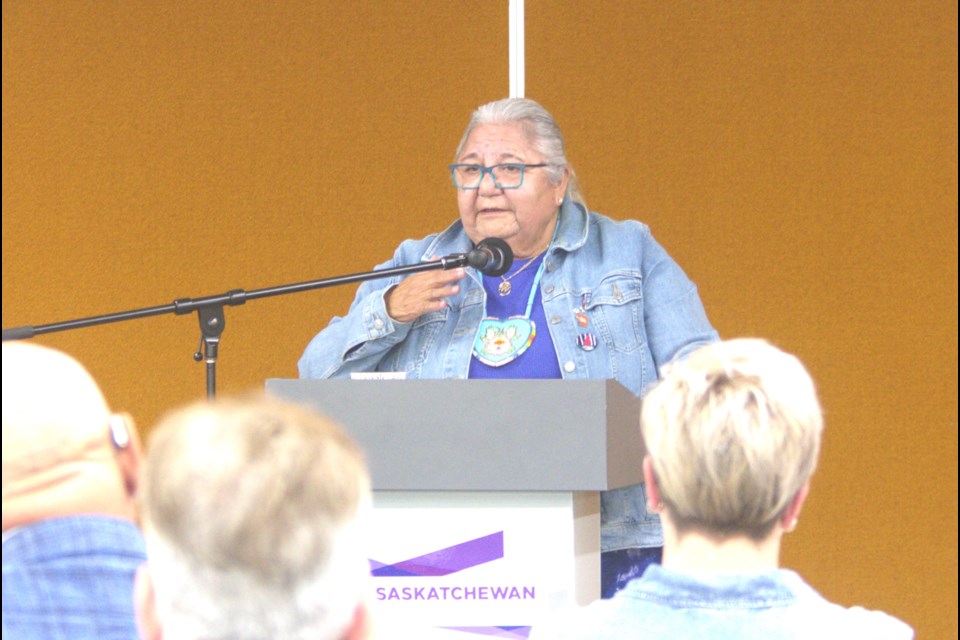MOOSE JAW — In recognition of the National Day of Action for Missing and Murdered Indigenous Women, Girls, and 2SLGBTQQIA+ people, Sask. Polytech’s Moose Jaw campus hosted “Sisters in Spirit” to honour and recognize these missing or murdered individuals.
The Oct. 4 event featured presentations by Hayley Hart-Rushinko, Jo-Anne Dusel, and Chief Marie-Anne Daywalker Pelletier.
“Statistics show that Indigenous women and girls are three times more likely to experience violence than any other demographic in Canada. They’re also more likely to experience more severe violence, to fear for their lives, and to experience multiple assaults from the same person,” stated Jo-Anne Dusel, director of the Provincial Association of Transition Houses of Saskatchewan.
“In Canada, a woman or girl is killed about every two days,” she said. “In most cases, the perpetrator is someone close to the victim… with the victim often bearing the burden of blame and shame. This needs to change.”
Women speak up
Chief Marie-Anne Daywalker Pelletier was born on April 15, 1954, in Regina, Sask. as a member of the Okanese First Nation. Today she remains the longest standing elected chief in Canadian History.
Daywalker served for 39 years and has witnessed the past 70 years of Indigenous relations in Canada.
“I’m a survivor. I went to the Indian residential school system for seven years,” she said. “(All) my life you could see I was losing my culture, my language… In my world, I’ve never said the word ‘mom’ or ‘dad,’ so I don’t know what it feels like.”
“We’re always being challenged (as an Indigenous community, and) we’re challenging everything (by) honouring the murdered and missing women today — but that should be every day, because we’re losing people every day,” she said. “We lost people yesterday, today, tomorrow, and we have to give the list to the government to be accountable for their lack of action.”
Hayley Hart-Rushinko is the communications and economic development officer with the City of Moose Jaw. She is Metis on her grandmother’s side and Nakota/Lakota on her grandfather’s side. “I am like many Indigenous people that have had to work to regain our culture, to meet my biological family, and learn the things that I was supposed to be raised with,” she said.
“When society treats you and raises you to feel like you’re less than others around you, you can only hear that so many times or feel the energy change in a room when you walk in… (until) you start to believe you are less,” Hart-Rushinko said.
She remembers being trailed when shopping, the looks and racial slurs that have been directed at her, and similar experiences no one should have to experience.
“One of my earliest memories is coming home from my grandmother’s and having our next door neighbour yelling at my father (saying) the Indian woman with him was using him to raise her three children and he needed to get away from us, followed by a number of racial slurs…”
Hart-Rushinko has since witnessed the city launching a new Indigenous logo, orange shirt campaign, and a new Indigenous relations page on the city’s website. “I’m also very proud to say at our last regular meeting of Moose Jaw city council, the first-ever Indigenous engagement framework for the city… was adopted… unanimously,” she added.
“Truthfully, to me, it’s a miracle I’ standing in front of you today in the profession that I’m in, surrounding by all the love that I have in my life,” she said with evident emotion.
Dusel has been an ally to the Indigenous community for more than 20 years. “In the words of Audre Lorde, ‘I am not free while any woman is unfree, even when her shackles are very different from my own,’” she said.
“If you don’t want to hear the truth… then we can’t grow together,” Chief Daywalker said in her closing remarks. “I’m going to be 71 years old soon, and I often wonder, how the heck did I do this?
“I really believe it was my grandparents (and) the words that they told me: ahkameyimok — keep going. (Have) love, respect, and never give up.”
Take action
There are many ways you can support women and girls at risk and the path starts by overcoming the natural hesitation to speak out and challenge others who express negative attitudes. Reconciliation involves treating others with respect every day.
Individuals can support campaigns and organizations that seek to end violence including the White Ribbon Campaign, Make It Our Business, and the RE:CONNECT line by calling 2-1-1 or visiting 211.ca. To learn about the White Ribbon Campaign visit WhiteRibbon.ca.
To learn more about the Make It Our Business campaign visit MakeItOurBusiness.ca.
For more information about the Daywalker Home Fire Family Centre established by Chief Daywalker on the Okanese First Nation, call 306-334-2503.




